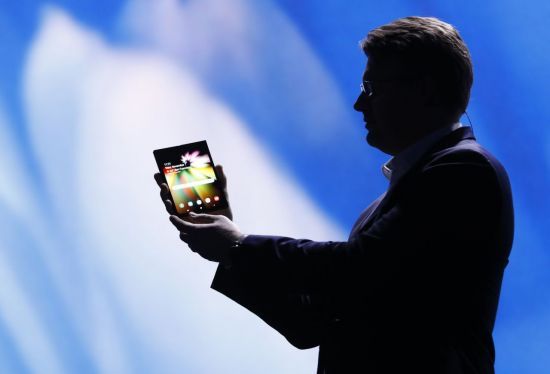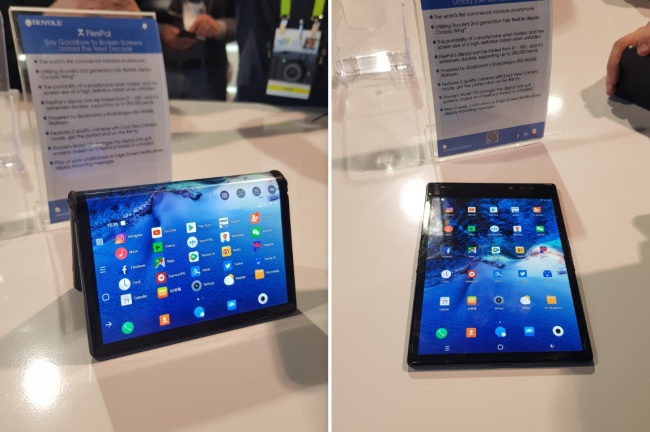LAS VEGAS -- Samsung Electronics showcased its foldable phone prototype to customers in a closed-door meeting at the Consumer Electronics Show in Las Vegas on Tuesday, offering a glimpse into what the South Korean tech giant’s folding phone would look like when completed.
According to a high-level executive from a customer of Samsung, the electronics maker is currently finishing up optimization processes for its foldable phone’s hardware and software.
“When unfolded, Samsung’s foldable phone does not show any crease indicating it had been bent,” the executive told The Korea Herald, adding that the device’s screen felt very smooth.
“However, completely folding the device will lead to a breakage. For this reason, Samsung is testing out the device so that the sides remain slightly lifted when folded. The prototype seen today leaves a crease mark when being folded, but this issue will be fixed in the finalized version.”
 |
A prototype of Samsung's foldable phone is showcased at the 2018 Samsung Developer Conference (Reuters-Yonhap) |
Samsung did not reveal its foldable phone, along with other products nearing commercialization, to regular visitors at CES but only to customers visiting its booth at the tech show.
According to the official, the display on Samsung’s foldable phone prototype is thinner when fully opened. When folded, the device allows a stable grip, rather than feeling thick, he added.
Samsung plans to launch its foldable phone in the first half of the year. But the firm will produce only around 1 million units, much less than the 10 million-unit production quota set for Samsung’s flagship Galaxy S series smartphones.
An executive at another customer who took a look at Samsung’s foldable phone prototype said that the encounter felt “similar to when Nokia first launched its folder phone in the past.”
Moreover, he said that Samsung’s foldable phone is “specialized for multitasking” and would be “highly useful for people who own both a smartphone and tablet.”
As for marketing strategies, Samsung is likely to target men in their 40s as the prime customers of its upcoming foldable phone, according to the industry.
Men in their 40s are familiar with “folder phones” introduced in the late 1990s and also tend to prefer mobile devices with bigger screens. They are also multitaskers who use their phones not only for work but also entertainment, such as games and movies.
“Because it’s equipped with the latest flexible display and battery technology, Samsung’s foldable phone is likely to be sold at 1.5 million won ($1,336) or more. Therefore, the company appears to have chosen men in their 40s with purchasing power as the prime customer base,” said a tech industry official on condition of anonymity.
While Samsung is putting the finishing touches on its folding phone demo, Chinese technology company Royole has stolen the spotlight at CES with the world’s first commercialized foldable phone with a flexible display: the Royole FlexPai.
 |
Royole`s foldable phone FlexPai is on display at CES 2019 in Las Vegas, Tuesday (Sohn Ji-young/The Korea Herald) |
The Royole FlexPai has been the talk of the town at CES 2019, with visitors and media professionals alike forming long queues to check out the FlexPai’s design and functions.
When unfolded, the FlexPai looks more like a small tablet PC than a smartphone, due to its wide screen. It also feels thicker overall than a standard flagship smartphone, and becomes even bulkier when folded.
As for its design, the phone did not leave any creases when folded or unfolded. Asked about the possible “breakage point,” a Royole official on-site said durability tests have proven that the phone can be folded more than 200,000 times before breakage issues emerge.
When folded, the phone takes on three different screens -- one side, the opposite side and the middle crease section. On the home screen, one main screen brings together all the apps, after which the phone can be used more like a standard smartphone.
The FlexPai is already available for purchase in China at between $1,318 and $1,469, depending on the amount of RAM and storage space. It will be rolled out in global markets in the months ahead, according to Royole.
By Song Su-hyun and Sohn Ji-young
Korea Herald correspondents
(
song@heraldcorp.com), (
jys@heraldcorp.com)









![[Today’s K-pop] Blackpink’s Jennie, Lisa invited to Coachella as solo acts](http://res.heraldm.com/phpwas/restmb_idxmake.php?idx=644&simg=/content/image/2024/11/21/20241121050099_0.jpg)